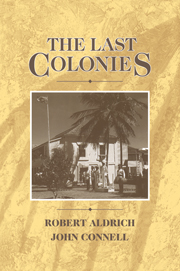Book contents
- Frontmatter
- Contents
- List of Maps and Tables
- Acknowledgements
- Abbreviations
- Overseas Territories
- Inset 1: Central Pacific Ocean
- Inset 2: Caribbean Sea
- The Western Mediterranean
- Dedication
- 1 The Legacy of Empire
- 2 Constitutional Issues
- 3 The Economic Transition
- 4 The Quest for Independence?
- 5 Military Bases, Geopolitical Concerns
- 6 Disputed Territories, ‘Colonial’ Conflicts
- 7 The End of Empire?
- Appendix: Profiles of Overseas Territories
- Notes
- Index
4 - The Quest for Independence?
Published online by Cambridge University Press: 19 January 2010
- Frontmatter
- Contents
- List of Maps and Tables
- Acknowledgements
- Abbreviations
- Overseas Territories
- Inset 1: Central Pacific Ocean
- Inset 2: Caribbean Sea
- The Western Mediterranean
- Dedication
- 1 The Legacy of Empire
- 2 Constitutional Issues
- 3 The Economic Transition
- 4 The Quest for Independence?
- 5 Military Bases, Geopolitical Concerns
- 6 Disputed Territories, ‘Colonial’ Conflicts
- 7 The End of Empire?
- Appendix: Profiles of Overseas Territories
- Notes
- Index
Summary
The aspiration for independence is not simply reducible to economic categories or a history of development. Colonisation and decolonisation remain fundamentally a question of dignity.
Paul Neaoutyine, President of the FLNKS, January 1993In no more than two decades between the 1950s and 1970s, vast colonial empires that had taken centuries to assemble almost totally disappeared. All the colonial powers witnessed, and sometimes expedited and encouraged, the disintegration of their global realms. The world map was rapidly transformed. As decolonisation proceeded, it was initially assumed that there were necessary limits to the process, limits that were a function of size: small colonies, in population and area, would not have the viability necessary for independence. Central to this was economic viability, a hazy notion, but one that implied that independent states should be more or less able to balance imports and exports, and that, over time, their need for external assistance would disappear.
Elsewhere in the world, micro-states already existed. In Europe a few tiny states retained independent status even when surrounded by a larger state. Thus San Marino, encircled by Italy and with a population of just 20,000, was a sovereign state, with all the panoply of statehood (flag and stamps, if not currency, and diplomatic rights). Similarly Monaco, the Vatican City, Liechtenstein and Andorra all had independent political status, though few were represented in the United Nations.
- Type
- Chapter
- Information
- The Last Colonies , pp. 113 - 168Publisher: Cambridge University PressPrint publication year: 1998



